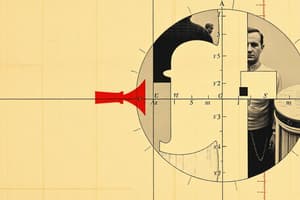Podcast
Questions and Answers
What is the distance formula?
What is the distance formula?
- Distance = (x2 - x1) + (y2 - y1)
- Distance = √((x2 - x1)² + (y2 - y1)²) (correct)
- Distance = |x2 - x1| + |y2 - y1|
- Distance = (x2 + x1) / 2
What is the midpoint formula?
What is the midpoint formula?
(x1 + x2 / 2, y1 + y2 / 2)
An angle bisector divides an angle into two congruent angles.
An angle bisector divides an angle into two congruent angles.
True (A)
Collinear points are points that lie on the same plane.
Collinear points are points that lie on the same plane.
What are complementary angles?
What are complementary angles?
Congruent figures are figures that are equal in measure.
Congruent figures are figures that are equal in measure.
Coplanar refers to points that are on the same line.
Coplanar refers to points that are on the same line.
What defines a line in geometry?
What defines a line in geometry?
What is the definition of a midpoint?
What is the definition of a midpoint?
Perpendicular lines form angles that are all 60 degrees.
Perpendicular lines form angles that are all 60 degrees.
Define a plane in geometry.
Define a plane in geometry.
What is a point in geometry?
What is a point in geometry?
What is a segment bisector?
What is a segment bisector?
What are supplementary angles?
What are supplementary angles?
What is a vertex?
What is a vertex?
Vertical angles are angles formed by two intersecting lines and are always congruent.
Vertical angles are angles formed by two intersecting lines and are always congruent.
Flashcards are hidden until you start studying
Study Notes
Key Geometry Concepts
-
Distance Formula: Calculates the distance between two points ((x1, y1)) and ((x2, y2)) using the formula ( \sqrt{(x2−x1)^2+(y2−y1)^2} ).
-
Midpoint Formula: Determines the midpoint between two endpoints ((x1, y1)) and ((x2, y2)) with the formula ( \left(\frac{x1+x2}{2}, \frac{y1+y2}{2}\right) ).
-
Angle Bisector: A line or ray that splits an angle into two equal angles, ensuring congruence.
-
Collinear Points: A collection of points that all lie on the same straight line.
-
Complementary Angles: Two angles whose measures add up to 90 degrees.
-
Congruent Angles: Angles that have the same measure, indicating equality.
-
Coplanar Points: Points that all exist within the same geometric plane.
-
Line Definition: A straight one-dimensional figure that extends infinitely in both directions, containing an infinite number of points and having no thickness.
-
Midpoint: The exact center point between two endpoints of a line segment.
-
Perpendicular Lines: Two lines that intersect to form four right angles (90 degrees each).
-
Plane: A flat two-dimensional surface with no thickness that extends infinitely; defined by at least three non-collinear points.
-
Point: An exact location in space, represented by a dot and labeled with a capital letter, having no dimensions.
-
Segment Bisector: A specific line or segment that divides another segment into two equal parts.
-
Supplementary Angles: Two angles that together total 180 degrees.
-
Vertex: The point where two lines or rays meet to form an angle.
-
Vertical Angles: Angles that are opposite each other when two lines intersect, known for being congruent (equal in measure).
Studying That Suits You
Use AI to generate personalized quizzes and flashcards to suit your learning preferences.




